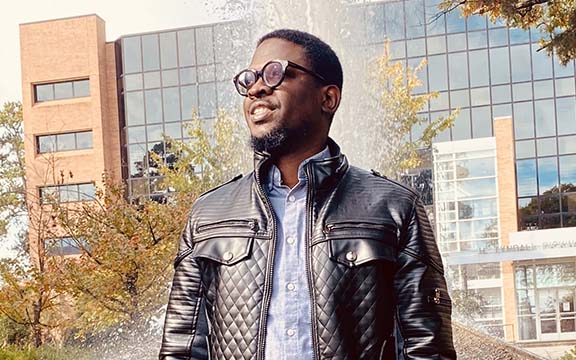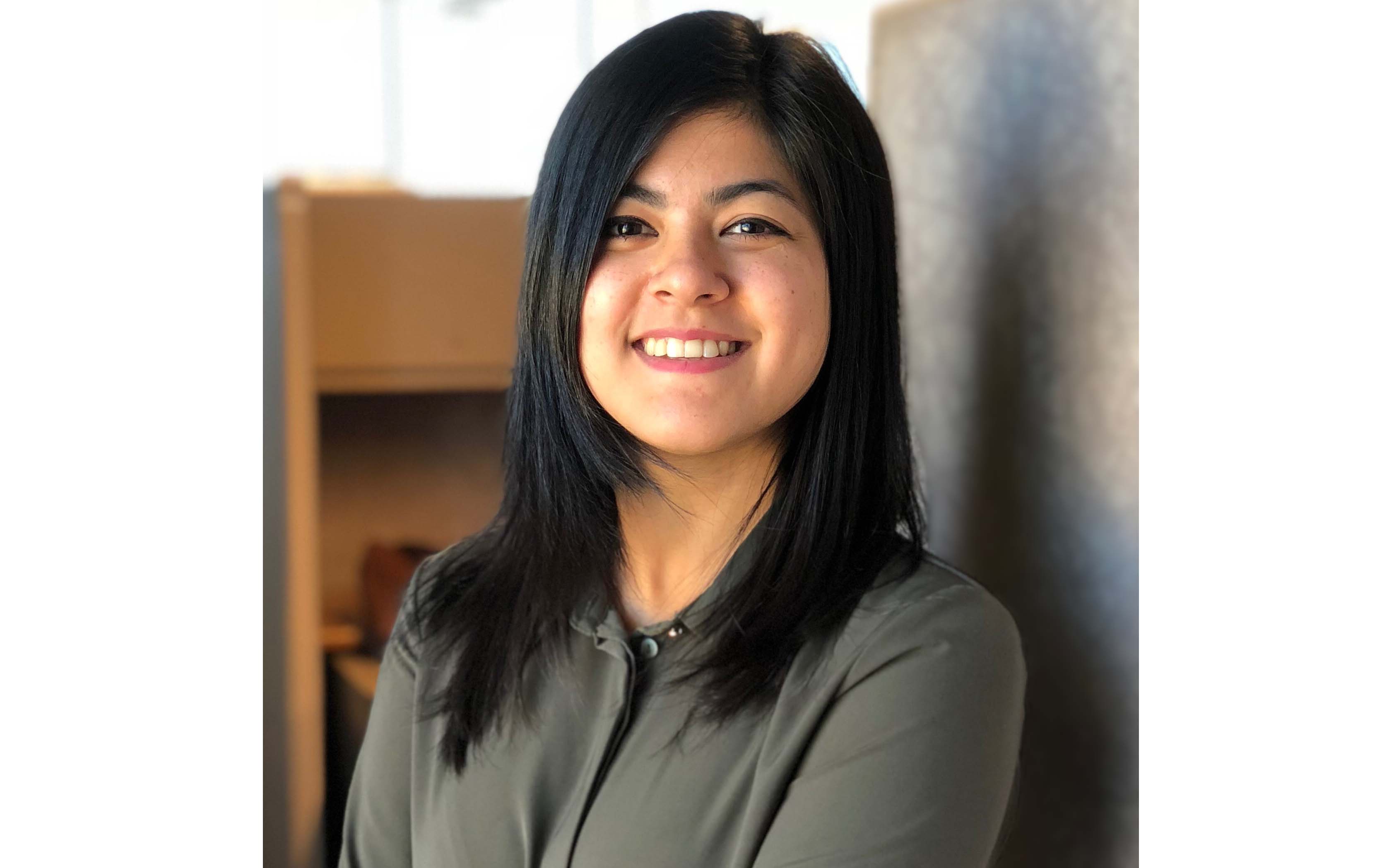UA Little Rock Graduate Spotlight: Degrees of Greatness
June 28 - July 4, 2021
This is the second and last installment of a series of stories on selected 2021 graduating students at the University of Arkansas at Little Rock. This year, UA Little Rock held a “hybrid” commencement ceremony that included a permanent, professionally edited video posted on June 5 of the speeches, graduates’ names, and photos of students in their caps and gowns. In addition to the video commencement, UA Little Rock held an in-person degree recognition ceremony for undergraduate students over the weekend of April 24-25. The UA Little Rock Bowen School of Law held a separate ceremony on May 15, and the Graduate School will soon be announcing its plans for separate in-person ceremonies for doctoral and master’s degree students.
UA Little Rock student Babatunji Ogunjobi
by Angelita Faller
Babatunji “Ted” Ogunjobi is graduating this month with a master’s degree in business information systems from UA Little Rock and a perfect 4.0 GPA.
Even though he had previously founded three startup companies, Ogunjobi had never joined a business program before UA Little Rock.
“I chose the Business Information Systems Program because the curriculum blends acquiring business management and technology skills relevant for the technology driven world we live in today,” he said.
A native of Nigeria, Ogunjobi is putting his business skills and entrepreneurial mindset to good use as a senior business program manager at Microsoft.
“There I will join the team in the quest to build products that empower every individual and organization in the world,” Ogunjobi said.
Tell us about yourself.85
My name is Babatunji Ogunjobi, but most people call me Ted. I grew up in Lagos, Nigeria, and lived there for 31 years. My first degree was a bachelor’s degree in engineering in information and communication technology, which I obtained in 2012 from Covenant University, Nigeria. I am very entrepreneurial, having previously founded three startups.
In 2019, after having worked in Nigeria for six years at an insurance company, I decided to leave to acquire a Master of Science degree in Business Information Systems at UA little Rock. I also wanted to gather more knowledge and apply my skills to organizations on a more global scale. I will be graduating from this program with distinction and a 4.0 GPA.
How do you feel about your upcoming graduation?
I am very excited. This degree is coming nine years after I obtained my first college degree and 15 years after I was refused a visa to study in the U.S. because the consular officer said I was a mediocre student.
I am glad I am graduating against all odds with distinction. I have received different awards and scholarships along the way including:
• 2019 UA Little Rock International Students Scholarship Award
• 2020 National Sales Network Leadership Award
• 2020 National Society of Black Engineers Apex Scholar Award
• 2020 Grad Cohort for the Underrepresented Minorities and Persons with Disabilities Workshop by the Computer Research Association
• 2021 National Society of Black Engineers BCA/Affiliate/ Fellows Scholarship
Why did you choose UA Little Rock?
I chose UA Little Rock originally because of the international student diversity, graduate assistantship opportunities, affordable cost of living in Little Rock, the Business School’s AACSB certification, and huge research base through centers like COSMOS and ASBTDC.
Why did you choose to study business information systems?
I had spent the last decade gathering technology skills and spent some time building startups/businesses. However, I had never formally enrolled for a business program. I chose Business Information Systems because the curriculum blends acquiring business management and technology skills relevant for the technology driven world we live in today.
What teachers inspired you at UA Little Rock?
All of my teachers were great. I am especially thankful to Dr. Robert Michell, Dr. Sung-Kwam Kim, Dr. Karen Leonard, and Dr. Alan Boss.
What do you plan to do after graduation?
This June I will be commencing work at Microsoft as a senior business program manager. There I will join the team in the quest to build products that empower every individual and organization in the world.
Did you participate in any extracurricular or service activities?
I was a member of the Association for Information Systems, UA Little Rock Chapter. I was also a digital decoder volunteer with Amnesty International.
What is your favorite memory of UA Little Rock?
The opportunity to meet students from diverse cultures and taste cuisines from different countries especially at Karl Lenser’s Friday lunch for international students. This made my first year here very memorable.
What advice would you give to future students?
UA Little Rock is a great place to achieve your educational goals. The student base is very diverse, the curriculum is top notch, and the university provides a pedestal for the audacious to achieve the impossible.
Is there anything else you’d like to add?
I was a summer scholar intern for HP in 2020, and I interned at First Orion Corporation in Little Rock as a product analyst between January and April 2021.
On campus, I worked as a graduate research assistant within the Records and Registration department for Malissa Mathis, registrar, and Dana Steele, associate registrar. Their managerial styles were worthy of emulation, and I gained a lot of knowledge working for them.
UA Little Rock computer science graduate to begin new career as Walmart data scientist
by Angelita Faller
After studying at UA Little Rock as an exchange student in 2013, Tuja Khaund, a native of Dibrugarh, India, couldn’t stay away.
“It was very exciting at first,” Khaund said. “I had never been out of my country. It was one of the biggest challenges. We got to learn about different cultures and people and we made a lot of friends. It was quite the journey.”
After her study abroad experience, Khaund returned to Little Rock as a full-time computer science student in 2014. Now she is graduating with a Ph.D. in computer and information science and a new career as a senior data scientist at Walmart Inc.
Khaund first met with Walmart recruiters during a campus job fair in 2020. She was offered an internship and spent last summer creating a 3D augmented reality application to visualize Walmart sales across the country. In her new role as a senior data scientist, she will join the NexTech Data Science Team at Walmart. She will specialize in graph theory.
“My work will focus on what I’ve been doing in my Ph.D., and I will extend that knowledge to work for Walmart,” Khaund said. “I will use information about consumers and consumer relationships through graphs. One example is to understand customer behavior based on their shopping patterns. That is a very popular problem that companies are trying to solve. I will utilize my knowledge on graph theory to solve problems in that domain.”
As a graduate student, Khaund spent one year studying virtual reality and augmented reality in the Emerging Analytics Center before joining the Collaboratorium for Social Media and Online Behavioral Studies (COSMOS).
Her research focuses on social media data analysis, social computing, and network analysis. More specifically, it focuses on cyber forensic analysis of blogs and Twitter content in order to detect covert connections and digital footprints of a website, a user, or an organization. She has also extended her research to study issues on other social media platforms such as YouTube and Telegram.
“Our students come from different parts of the world,” said Dr. Nitin Agarwal, Maulden-Entergy Endowed Chair and Distinguished Professor of Information Science and director of COSMOS. “Many of them belong to minority and underrepresented groups in STEM disciplines – a cause that COSMOS champions and celebrates. Tuja will work as a senior data scientist at a Fortune 500 company. She has done tremendously well with her dissertation and has an exciting career awaiting her.”
Khaund has also participated in the 2020 Computing Research Association Grad Cohort for Women, which helps graduate students prepare for careers in the computer science industry. She serves as web chair for the International Conference on Social Computing, Behavioral-Cultural Modeling, & Prediction and Behavior Representation in Modeling and Simulation.
Khaund completed her dissertation, which presents a methodology to assess how online campaigns are coordinated. Khaund began by studying how social bots, automated accounts on social media websites that mimic the social behaviors of humans, are used during natural disasters like hurricanes and earthquakes.
“Social bots help automate many socio-technical behaviors such as tweeting/retweeting a message, ‘liking’ tweets, following users, and coordinating with or even competing against other bots,” Khaund said. “Social bots exist as benign bots such as advertising bots, entertainment bots, etc. as well as malicious bots such as spam bots, hackers, and influence bots.”
As social bots become more sophisticated, some of these bots operate independently and autonomously for years without getting noticed or suspended. Furthermore, some of the more advanced social bots exhibit highly sophisticated coordination and communication patterns with complex organizational structures.
“There is a lot of work going on to tackle a problem that is quite challenging for social media platforms and for anyone who is trying to stop malicious activities during events,” Khaund said. “Malicious actors have become more advanced. They know what tactics people are using to track them. Previously, it was easier to look at a profile and recognize a fake account. They have since evolved and are now becoming more immune to detection algorithms. They are finding new ways to remain hidden and undetected.”
She analyzed a Twitter dataset with accounts that were suspected of being used to influence the 2016 presidential election. She then trained a machine learning model to assess the level of coordination within an online information campaign.
“My model is promising enough to accurately describe a high coordination social network or a low coordination social network,” Khaund said. “My model can be replicated or used across different social media platforms. It leverages social network theories to understand the structure of a communication network and analyzes various network measures to label communities in a graph.”




